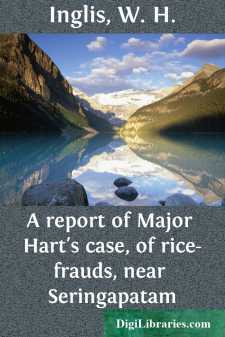Categories
- Antiques & Collectibles 13
- Architecture 36
- Art 48
- Bibles 22
- Biography & Autobiography 813
- Body, Mind & Spirit 142
- Business & Economics 28
- Children's Books 17
- Children's Fiction 14
- Computers 4
- Cooking 94
- Crafts & Hobbies 4
- Drama 346
- Education 46
- Family & Relationships 57
- Fiction 11829
- Games 19
- Gardening 17
- Health & Fitness 34
- History 1377
- House & Home 1
- Humor 147
- Juvenile Fiction 1873
- Juvenile Nonfiction 202
- Language Arts & Disciplines 88
- Law 16
- Literary Collections 686
- Literary Criticism 179
- Mathematics 13
- Medical 41
- Music 40
- Nature 179
- Non-Classifiable 1768
- Performing Arts 7
- Periodicals 1453
- Philosophy 64
- Photography 2
- Poetry 896
- Political Science 203
- Psychology 42
- Reference 154
- Religion 513
- Science 126
- Self-Help 84
- Social Science 81
- Sports & Recreation 34
- Study Aids 3
- Technology & Engineering 59
- Transportation 23
- Travel 463
- True Crime 29
A report of Major Hart's case, of rice-frauds, near Seringapatam
by: W. H. Inglis
Categories:
Description:
Excerpt
Were any apology necessary for this Report, a sufficient one would be where Major Hart says, "When I add that Major-general Macaulay was my junior officer; that, in consequence of my dismission, he succeeded to the very regiment which, at this hour, I should have otherwise commanded, and became a general officer so much sooner by my dismission; I am satisfied that the Honourable Court (of Directors) will think his conduct a most material feature in the future consideration of my case."—India-House-Papers, p. 362.
Another instance of Major Hart's sinister attack is, where Major-general Macaulay has replied to it, saying, "There remains a farther slanderous insinuation of Major Hart's, that I think myself bound to notice. He has charged upon me, as a leading motive in the censure of his conduct, a settled design of placing myself in the command of the fortress of Palamcottah, and of the forces in the field in Tinnevelly, to his exclusion! This strange charge he more than once gave distinct hints of to myself. But he made it directly in the course of his last visit to me, in June 1815, when he behaved so coarsely. It will, I have little doubt, seem somewhat strange, even to your Lordship, (Harris, the commander-in-chief,) but so it is, that to this hour I do not know to whom I owe that command. I not only never made application directly or indirectly for it, but the idea of applying for it never once entered my mind.—Papers, p. 388.
But Major-general Macaulay scarce needed this reply, since it is Major Hart himself who can affirm his own error. The Major says, "I shall not however pretend to defend the act acknowledged of my having carried to the field a quantity of private grain. No, my Lord, (Harris,) most deeply and sensibly do I feel and deplore the error of my conduct.—Papers, p. 352.
And yet, notwithstanding this pretended acknowledgment of real error, it is the Board of Controul which, in order to allow Major Hart to hold private grain, must set aside the very regulation upon this subject. The 39th Regulation says, "it being the principle of the present system, by liberal and avowed allowances, to place this department upon so respectable a footing as to leave no temptation to seek for unauthorized advantages, the Commissary of Grain is not on any account, directly or indirectly, to derive any other advantage or emolument from this situation than the salary fixed by Government. The strictest economy is, therefore, to be observed in every expense attending this department; and the disbursements and accounts of the Commissary are to be attested on honour, as prescribed in the forms annexed to these Regulations.—Papers, p. 17.
And the mighty Board of Controul, besides allowing Major Hart to hold private grain, and therefore to reap the attendant profit on it with perfect security, next considers this both as another question and as not another question. Thus the Board having said "whether he (Major Hart) ought to have derived any profit upon the original price of the rice, so in his possession, is another question," can yet add, "but suppose he ought not, when he openly supplied it to our army, and was contented with much less (profit) than he might have obtained with perfect security, we cannot think it a crime of the blackest die.—Papers, p. 232.
The Board continues "this, and the circumstance of his silence, from the 16th to the 22d of April, appear to us the only points of doubt in the whole case, and a conduct doubtful only on two such points does not, in our contemplation, warrant the sentence that has been passed upon it, with the consequences to his fortune and honour to which it has led." Papers, p....


